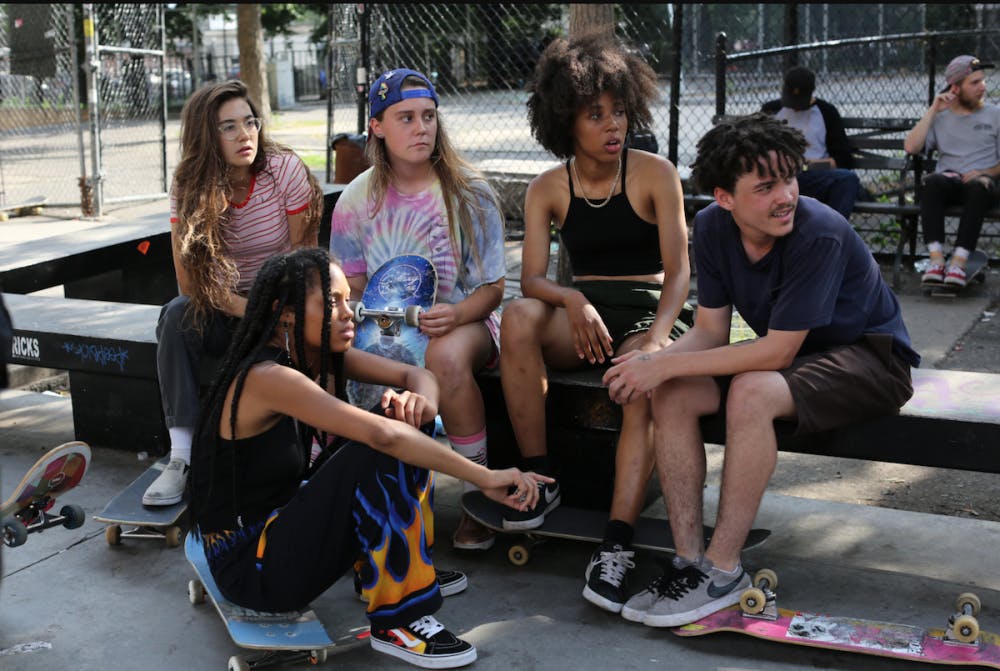When Camille skates, she’s skating against the wishes of her mother. She’s also skating despite the expectations of the community. Her home life is a classic single-parent dynamic, her sport is one that’s crowded by boys. This is the premise of Skate Kitchen, director Crystal Moselle's new film. The teenage Camille, played by the very cool Rachelle Vinberg, is skating against stereotypes. As far as she knows, the only place where other girls skate is online.
The film has a lot of similarities to Moselle’s debut, The Wolfpack, which follows the lives of the six Angulo brothers who find strength and solace in movies, despite being forcibly isolated in their family’s apartment for most of their young lives.
Skate Kitchen, released August 10th and playing starting August 17th at the Ritz at the Bourse in Philadelphia, contains similar ingredients. Trade a locked apartment for the glass ceiling, six riveting brothers for an equally riveting girl gang, and the freedom of film for the freedom of a flip trick. While not a documentary, Skate Kitchen co-opts elements of the genre for tonal effect.
When a collective she follows on Instagram announces a girls' skate, Camille ventures into the Big Apple to take matters into her own hands. On the ramps at LES Park ride the Skate Kitchen—there’s ballsy Kurt (Nina Moran), motherly Janay (Ardelia 'Dede' Lovelace), and the rest of the girl gang, all colorful and complex in their own right. There’s also Devon—an aloof amateur photographer who catches Camille’s eye and who sends more than one shockwave through her social circle. It’s a story about finding identity, finding a home away from home, and the strength of female relationships.
The Skate Kitchen is a real group founded by Vinberg and Moran, who first reached out to each other in the YouTube comments section. The group’s members dabble in fashion, videography, and—in this case—acting. They’re also much more open to skating with guys than their film counterparts are. In a TEDx Talk given by Moran last December (aptly titled “Girls Belong In The (Skate) Kitchen”), Moran describes the overwhelming positive feedback and gratitude she’s received from young girls around the world.
Many characters are based on the actors themselves; on screen, Kurt is as unfiltered and gay as Moran is in real life; Devon, played by Jaden Smith, is kind of an ass (we’ll let you decipher that one yourself). Vinberg and Camille share the same passion for the board, the same wardrobe, and similar life experiences.
The opening scene where Camille gets credit-carded (aka when the edge of the board swipes, er, slices one’s genitals) mirrors Vinberg’s real-life experience of getting credit-carded, twice. Even the reactions to the injury are drawn from reality: the boys at the park assume the blood streaming down Camille’s thighs is due to her period.
The documentary-style film depicts misogyny as routine, unscripted sexism pervades side conversations, fans fight. Girl skaters aren’t taken seriously. Camille gets her vagina cleaved and the boys diagnose it as “that time of month.” Skate culture itself is so claustrophobically male that collectives like Skate Kitchen are necessary for girls to have the opportunity to skate with, you know, other girls. Most striking is a conversation the squad has on the subway: one girl recounts blacking out then waking up and realizing she’d been raped. The others chime in with similar stories.

A scene from SKATE KITCHEN, a Magnolia Pictures release. Photo courtesy of Magnolia Pictures.
At times, the movie gets lost in itself—in overly intense close-ups and rambling monologues, Skate Kitchen loses focus. The observational style that once lent insight now and then lazes at the periphery. Casual conversations slant banal, and Moselle borrows a lot from the standard documentary structure. On the positive side, the film feels authentic—a manufactured story that doesn’t feel manufactured. On the negative, documentaries are sometimes, well, a bit boring.
For the most part, Skate Kitchen shines, especially in montages of Camille skating. Frustration is evident with each stumble, anger with each jolt of the board. Camille skitters on concrete when she first meets the girls—she’s nervous. Her board soars when she’s with a crush. And her thrill, her lust for life, is in each outstretched limb, each kick, push, and cruise.
The girls in Skate Kitchen are fierce, funny, and they take no shit. They smoke weed from halved bananas and play with fidget spinners. When they inevitably screw things up, they own it. They refuse to define themselves by the men in their lives. They have each others’ back. Their flawed efforts are refreshing, believable, and set to a perfect soundtrack by Princess Nokia. Jaden Smith, who lends star power to the cast, is likeable enough, but the real star of the film is undoubtedly Skate Kitchen.

